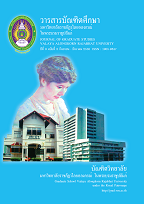แนวทางการจัดการเรียนรู้คณิตศาสตร์ สำหรับเด็กที่มีความบกพร่องทางการเรียนรู้ APPROACH TO LEARNING MATHEMATICS FOR STUDENT WITH LEARNING DISABILITIES
Main Article Content
บทคัดย่อ
บทคัดย่อ
การวิจัยในครั้งนี้มีวัตถุประสงค์เพื่อศึกษาแนวทางการจัดการเรียนรู้คณิตศาสตร์สำหรับ เด็กที่มีความบกพร่องทางการเรียนรู้ โดยการศึกษาจากเอกสารงานวิจัย และการวิจัยภาคสนาม โดยวิธีการสัมภาษณ์เชิงลึก ผู้ให้ข้อมูลได้แก่ ผู้เชี่ยวชาญด้านการศึกษาพิเศษ ครูผู้สอนคณิตศาสตร์ และนักเรียนที่มีความบกพร่องทางการเรียนรู้ เครื่องมือที่ใช้ในการวิจัย ได้แก่ แบบบันทึกเอกสารแบบสัมภาษณ์เชิงลึกควบคู่กับการทำบันทึกภาคสนามและแบบสังเกตพฤติกรรม วิเคราะห์ข้อมูลโดยการวิเคราะห์แบบอุปนัย
ผลการวิจัย พบว่า เด็กที่มีความบกพร่องทางการเรียนรู้เป็นความบกพร่องทางกระบวน การพื้นฐานทางจิตวิทยาที่เกี่ยวข้องกับความเข้าใจหรือการใช้ภาษา แสดงออกถึงความบกพร่องทางการฟัง การคิด การพูด การอ่าน การเขียน การคำนวณทางคณิตศาสตร์ ที่สืบเนื่องมาจากความบกพร่องของการทำหน้าที่ของสมอง ทำให้มีผลการเรียนต่ำเกิดช่องว่างระหว่างความเฉลียวฉลาดที่แท้จริงกับผลสัมฤทธิ์ทางการเรียน โดยมีแนวทางการจัดการเรียนรู้คณิตศาสตร์สำหรับเด็กที่มีความบกพร่องทางการเรียนรู้ ประกอบด้วย 1) จัดกิจกรรมการเรียนรู้คณิตศาสตร์ที่มีความหลากหลาย เพื่อให้นักเรียนสามารถเลือกกิจกรรมที่เหมาะสมกับความสนใจของตนเอง 2) เริ่มกิจกรรมการเรียนรู้คณิตศาสตร์จากง่ายที่สุดไปสู่กิจกรรมที่ความซับซ้อนมากขึ้น 3) สร้างความเชื่อมั่นในตนเองให้กับนักเรียนและส่งเสริมให้พัฒนาความสามารถที่มีอยู่ 4) เปิดโอกาสให้ผู้เรียนได้เรียนรู้โดยการสัมผัส การสังเกต การฟัง และการเคลื่อนไหวร่างกาย โดยใช้สื่อที่เป็นรูปธรรม 5) ใช้คำสั่งซ้ำๆ สั้น กระชับ เข้าใจง่าย 6) จัดกิจกรรมการเรียนรู้คณิตศาสตร์โดยคำนึงถึงความแตกต่างระหว่างบุคคล สอดคล้องกับแบบการเรียนรู้ของนักเรียน 7) จัดกิจกรรมการเรียนรู้คณิตศาสตร์ โดยให้นักเรียนได้ประสบความสำเร็จในการเรียนรู้ในแต่ละครั้ง 8) กระตุ้นและส่งเสริมให้ผู้เรียนเรียนรู้ร่วมกับเด็กทั่วไป ช่วยเหลือเกื้อกูลกัน 9) สร้างบรรยากาศการเรียนรู้ที่ผ่อนคลาย ปลอดภัย และมีความสุข 10) ประเมินตามสภาพจริงและให้ผลย้อนกลับทันที โดยการให้กำลังใจการชื่นชมในความสำเร็จ
ABSTRACT
The purposes of this research were to study appropriate approaches to learning management for children with mathematics. The study from documents research in the field by using in-depth interviews. Informant include special education professionals, math teachers and students with learning disabilities. The instruments used in research include, the indepth interviews in conjunction with the field notes and observation form. Then the researcher analyzed data by using analytic induction. The results are as follows;
The results of the research revealed that children with learning disabilities are disorders underlying psychological processes involved in understanding or in using language, resulted expression of impaired thinking, speaking, listening, reading, writing, mathematics, leading to low academic ability, the gap between the real ability and achievement. The appropriate approaches to learning management for mathematics children with learning disabilities include: 1) Activities with a variety of learning method so that students can choose appropriate to their own interests, 2) Start learning math from easiest to an event that more sophisticated, 3) Build self-confidence to students and encourage them to develop their abilities available, 4) Provide an opportunity for students to learn by through visual, auditory, tactile learning using concrete media, 5) Use the command repeatedly, concise, easy to understand, 6) Taking into account individual differences correspond to learning style of student, 7) Conducting activities for students have succeeded in learning each time, 8) Encourage the students to learn with regular children and help one another, 9) Create a learning environment that is safe, relax and happy, and finally, use authentic assessment and provide immediate feedback by encouraging the joy of success.
Article Details

อนุญาตภายใต้เงื่อนไข Creative Commons Attribution-NonCommercial-NoDerivatives 4.0 International License.
บทความทุกเรื่องได้รับการตรวจความถูกต้องทางวิชาการโดยผู้ทรงคุณวุฒิ ทรรศนะและข้อคิดเห็นในบทความ Journal of Global of Perspectives in Humanities and Social Sciences (J-GPHSS) มิใช่เป็นทรรศนะและความคิดของผู้จัดทำจึงมิใช่ความรับผิดชอบของบัณฑิตวิทยาลัย มหาวิทยาลัยราชภัฏวไลยอลงกรณ์ ในพระบรมราชูปถัมภ์ กองบรรณาธิการไม่สงวนสิทธิ์การคัดลอก แต่ให้อ้างอิงแหล่งที่มา


